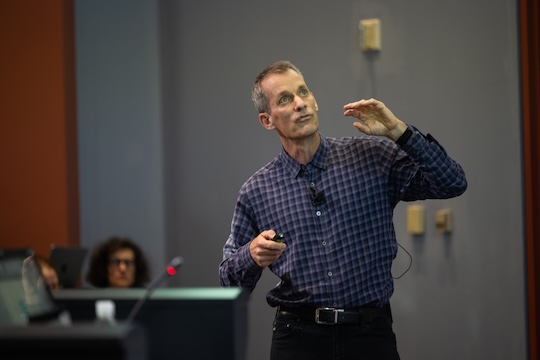Jeff Dean, chief scientist at Google, spoke at Rice University Feb. 13 to discuss trends in artificial intelligence (AI) and machine learning (ML).
Dean was integral to developments in the fields of AI and ML and he continues to shape the future, said Ken Kennedy Institute Director Lydia Kavraki, who provided an introduction. She said the institute envisions a world where research in AI, data and computing empowers all people and enhances human experience.
Dean’s areas of focus not only include AI and ML but the applications of AI to problems that help billions of people in societally beneficial ways. His work has been fundamental to many generations of Google’s search engine, its initial ad serving system, distributed computing infrastructure such as BigTable and MapReduce, and the Tensorflow open-source machine learning system as well as many libraries and developer tools.
The packed auditorium of students, staff and faculty listened to Dean present the work of his teams and others at Google, showcasing over a decade of AI and ML progress as well as what he sees as exciting trends on the horizon.
“In recent years, I think machine learning has really changed our expectations of what we think of computers being able to do,” Dean said. “If you think back 10 or 15 years ago, speech recognition kind of worked, but it wasn’t really seamless — it made lots of errors. Computers didn’t really understand images from the pixel level of what was in that image. There was a bunch of work in natural language processing, but it wasn’t really a deep understanding of language concepts and multilingual data.
“But I think we’ve moved from that stage to one where you actually expect computers to be able to see and perceive the world around us in a much better way than they were able to 10 years ago. And that opens up all kinds of amazing opportunities in pretty much every field of human endeavor.”
This success can be attributed to scale — increasing the scale of the computer, data or model size tends to deliver better results, Dean explained. He also noted that new models and approaches have had dramatic implications for applying ML to many problems in the world in science, engineering and health.
“Every time we scale things up, things get better,” he said. “All of a sudden, new capabilities emerge or the accuracy of some problem reaches a threshold, where before it was kind of unusable and now all of a sudden it becomes usable, and that enables new kinds of things.”
The talk was sponsored by the Ken Kennedy Institute, an interdisciplinary group that works collaboratively on groundbreaking research in AI, data and computing. View Dean’s lecture on the Ken Kennedy Institute’s YouTube here.

